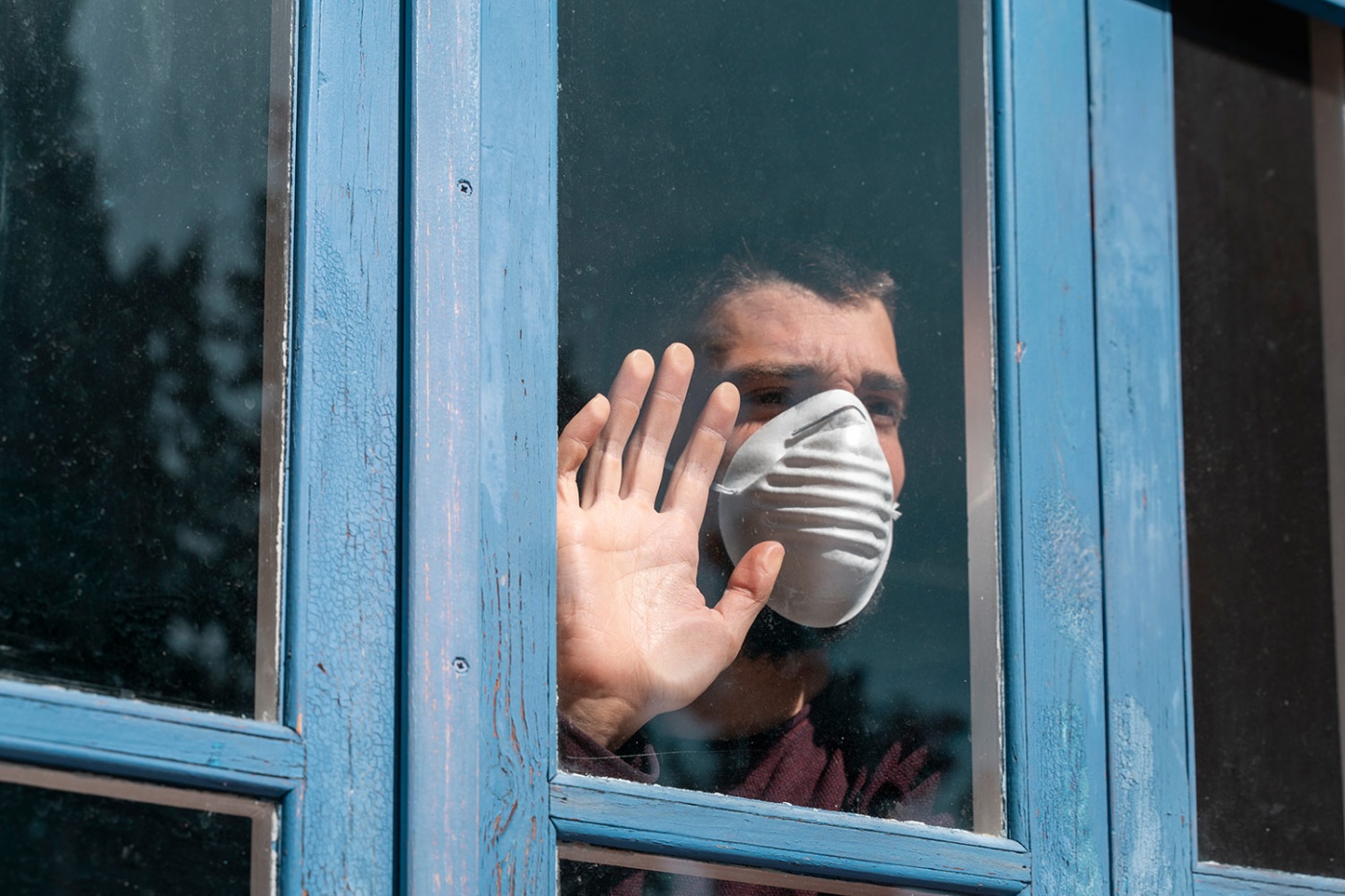Human Decency Is Needed to Fight the Fallout From Covid-19
The bright side of the global lockdown is that it’s keeping more than half the world’s population, some 4.5 billion people, in some form of home confinement and the environment finally has time to heal. Fewer people are falling sick from other infections due to social distancing and crime has fallen around the world with March 2020 being the first March without a U.S. school shooting since 2002, if that is anything to celebrate.
In Singapore where people are finding it harder to be locked up in tiny apartments, the unofficial healthy new national pastime would be to go out and exercise, grocery shop, or buy lunch and dinner, with some folks finding more purpose outdoors as mask vigilantes or champions of foreign worker rights.
The CB (circuit breaker) has been refreshing fun for those living in comfortable spacious abodes, surrounded by plants, lounging from room to room and undisturbed by neighbours; working from home in your pajamas and deciding to have pasta for breakfast, red velvet cake for lunch and turkey-otah-mayo-pickle sandwich for dinner (the sandwich is a true story shared by a friend) before vino under the stars.
Yet it is only a pipe dream for most others, and the global war on the Covid-19 virus has brought to light the massive disparities in wealth and access to medical treatment between the different economic classes of various societies. For the criticism levelled at “two very different realities” of Singapore, one does feel a glow of pride at the assurance from Prime Minister Lee that the government will take over the expenses and wages of each foreign worker affected by their quarantines because we cannot see much of that happening in elsewhere. Although we are concerned to hear about the children home-learning on their smartphones from Engineeringgood.org, a charity refurbishing donated laptops for underprivileged kids.
As the global pandemic peaks, the irony of this once in a lifetime event is that the experience differs for different people, as illustrated below.
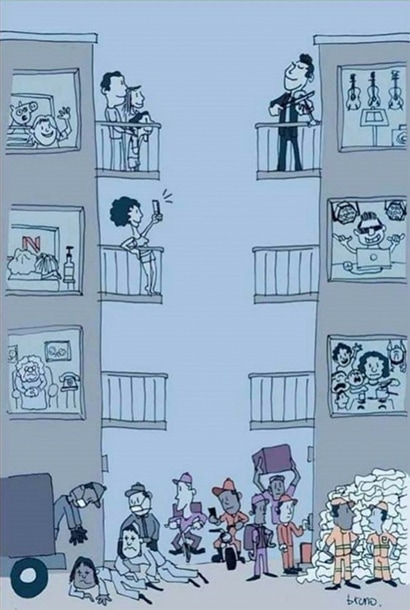 Source: Ian Bremmer on Twitter
Source: Ian Bremmer on Twitter
The hard truth for Americans (stats not available for Singapore), is that working from home is mostly an upper and upper-middle class phenomenon, so-called pen-pushing jobs and not for the production lines and service industry, and it has shown up in the 22 million jobless claims in the U.S. over the last month—effectively wiping out the total jobs created since the global financial crisis. And to make it look trivial, SCMP reports as many as 205 million Chinese workers cannot find jobs or are unable to return to their previous posts after emerging from their lockdowns.
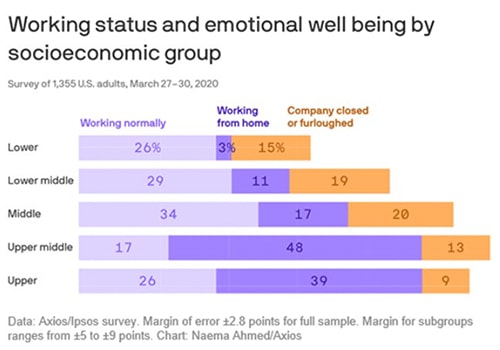 Source: Liz Ann Sonders on Twitter
Source: Liz Ann Sonders on Twitter
The lockdown has been a bad idea, as Michael Burry of The Big Short fame slammed the idea as “lockdowns intended to contain the coronavirus pandemic are worse than the disease itself.” Even the United Nations acknowledged the global economic downturn, warned by the IMF as possibly the steepest since the Great Depression of the 1930’s, sparked by the pandemic will force tens of millions into extreme poverty and with schools shut, “nearly 369 million children across 143 countries who normally rely on school meals for a reliable source of daily nutrition have now been forced to look elsewhere.” So much for lockdowns to protect the old and vulnerable as malnourishment of the young occurs. Think of what would happen to their formative brains, as millions of students in the U.S. lack access to the basics tools such as Internet connections required to study from home.
The dream plan would have been to test every single person and to isolate the sick while keeping society and thus the economy running, without the need to shutter millions of businesses and reduce their income generation to nothing. That is obviously impossible with lack of tests (with the exception of South Korea’s early testing rampage that successfully brought down infections), each government has been acting for themselves and no apparent global leadership which is a stark contrast to all previous crises (9-11 and Lehman) in our lifetimes where the U.S. would take the leading role in coordinating global response.
From an IMF blog post titled Economic Policies for the COVID-19 War on 1 April, “the COVID-19 pandemic is a crisis like no other. It feels like a war, and in many ways it is. People are dying. Medical professionals are on the front lines. Those in essential services, food distribution, delivery, and public utilities work overtime to support the effort. And then there are the hidden soldiers: those who fight the epidemic confined in their homes, unable to fully contribute to production.” It is a shutdown of large parts of the global economy when we have 4.5 billion in lockdown.
Businesses aside, the International Labor Organisation estimates the lockdowns affecting 2.7 billion workers with 1.25 billion extremely vulnerable, at high risk of a pay cut or losing their jobs.
For those who have the choice to work, deciding between employment and their health is virtually impossible, employees at U.S. meat processing facilities where four workers at a Tyson Foods poultry plant have died, at least 41 grocery workers have died of the virus in the U.S. along with bus drivers and sanitation workers who have bills to pay and families to feed. It is really not much of a choice.
Cheer up, Singapore is comparatively lucky compared to crisis in the Bangladesh garment industry where cancelled orders have resulted in millions of mostly women without pay and some without jobs with half of all jobs in Africa have been imperiled and call centres in Philippines facing uncertain futures by the economic shock of the pandemic lockdowns. Neither Bangladesh or most African countries are in any position to send out US$1,200 cheques to their citizens as the U.S. is doing and given the level of corruption, it is hard to see the G20 suspension of debt service payments for the 77 poorest countries in the world trickling down to their populations.
In Singapore, where the treatment of Covid-19 is free, the three budgets (Unity, Resilience and Solidarity) should tide the nation through, but the ultimate success of all the stimulus packages in the world really depends on human decency and Jay Powell was right in saying “I don’t know” what will happen in a rare Today Show interview on TV.
What have you done to help? And what will companies, landlords and banks do to help make sure that the government’s efforts do not fail and the economy comes to a soft landing after the pandemic?
“When things are at their worse, sometimes people are at their best,” says NY Governor Cuomo.
Singaporeans definitely are doing their part by the number of delivery riders, cars and vans on the roads. We drive down to Keong Saik to pick up dinner from Theva and Robertson Quay the next day for Bella Pasta, in support of friends or friends of friends, eating and eating just to help. Some young people intend to spend their S$600 government handouts on iPhones to support retail sales too.
Around the world, chefs are preparing meals for front-line hospital staff as a token of their appreciation and we read of diners giving free meals to laid-off restaurant and resort workers or teachers delivering meals to underprivileged students stuck at home. Philanthropists are sending masks, protective gear and ventilators to virus epicentres as banks suspend mortgage payments and the European Union changing their solvency laws to keep companies afloat.
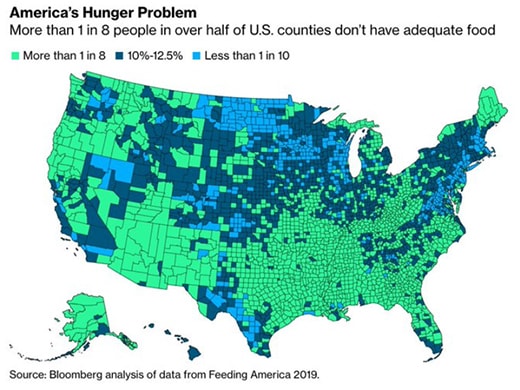 Source: Bloomberg
Source: Bloomberg
It is even surprising to read and learn that it is possible for insurance companies in the U.S. to return premiums to auto insurance customers because people are driving less. A Brooklyn landlord cancelled rent for hundreds of tenants, requesting that they look out for their neighbours and “make sure there is food on their table” instead.
We have Citi Singapore giving more than 1,600 employees earning S$70,000 or less per annum a one-off compensation of S$1,200. Morgan Stanley, Citigroup, HSBC and more banks pledged no layoffs in 2020. The New Zealand Prime Minister Ardern and her cabinet took a 20% pay cut for 6 months as Singapore leaders and company management are doing.
Meanwhile, American stimulus cheques will be delayed because Donald Trump wants his name to be printed on every one of them. Bloomberg reported that hedge funds and wealthy business owners have been claiming bailouts as small businesses, using up all of the $350 billion pledged for the Paycheck Protection Program (that only managed to pay out to 5.8% of all applicants), demonstrating poor moral judgment as investment firms pitched to wealthy clients to make returns of 22 to 175% off government programs intended to help the needy and boost the economy. Boycott Disney—which has stopped paying 100,000 workers to save US$500 million a month while protecting executive bonus schemes and US$1.5 billion dividend payment due in July.
Who knows if the banks have a part to play in the oil price collapse because they will inherit the energy assets as cheaper valuations? For U.S. banks are preparing to seize energy assets on the shale market collapse, and the Royal Bank of Canada has recently been sued by a REIT over margin calls in order to seize a large portfolio of assets at rock-bottom prices.
It does not get better when JP Morgan stopped making small business loans outside of those guaranteed by the government and temporarily stopped accepting applications for home-equity lines of credit this week.
In Singapore, some Lee Ah Mooi staff members have been evicted by their landlords for fear they may carry the virus, for the nursing home has a cluster of cases as other landlords in Singapore are complaining that tenants unaffected by the pandemic are demanding rental waivers because they can get away with it. It has also emerged that some people have been abusing the Covid-19 Temporary Relief Fund with a stern warning that the government will “come down hard” on them.
All this just as the ILO forecasts a global income drop of as much as US$3.4 trillion (not billion) this year for the workers, which means a lot of bills including mortgages may not get paid on time or at all and mortgage lenders prepare for a wave of delinquencies that would dwarf the sub-prime crisis and this time, it is global. Less income means less spending and businesses with less income mean even commercial and industrial landlords will be in peril as H&M, Primark and gang stop paying rent and Tesla is seeking rent reduction while Neiman Marcus and JC Penney missed interest payments in the midst of filing for bankruptcy. It would be a death spiral all the way to the banks indeed and a financial crisis.
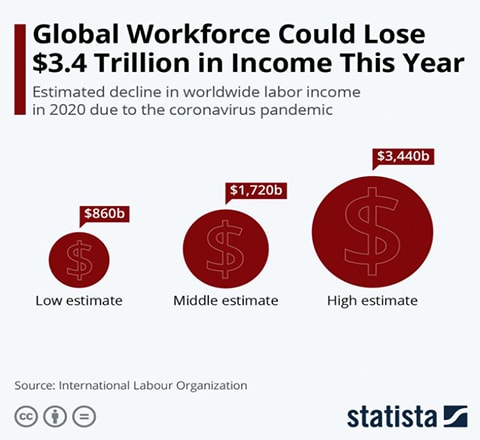 Source: Statista
Source: Statista
For us at home who are thinking of the next meal to buy or to go for a run as an excuse to ditch the mask, maybe it is time to think about making a difference instead?
As Henry Kissinger said in his recent op-ed on WSJ, “The pandemic has prompted an anachronism, a revival of the walled city in an age when prosperity depends on global trade and movement of people. The world’s democracies need to defend and sustain their Enlightenment values. A global retreat from balancing power with legitimacy will cause the social contract to disintegrate both domestically and internationally. An enlightened government believes it should provide security, order, economic well-being, and justice.” That should be our own goal as well as food for thought (instead of the next meal we are raring to get out of house to buy).
We think of the man in Florida who bought a bottle of bourbon for US$40,000 (double its original price) to help keep a restaurant in business as chefs and restaurateurs increasingly rely on the kindness of landlords to stay in business. And we think of what we can do, whether we win or lose out, to maintain human decency by continuing the efforts of others and save as many as we can from the fallout of the virus. As the Dalai Lama said, “prayer is not enough,” we need compassion to fight the virus.
